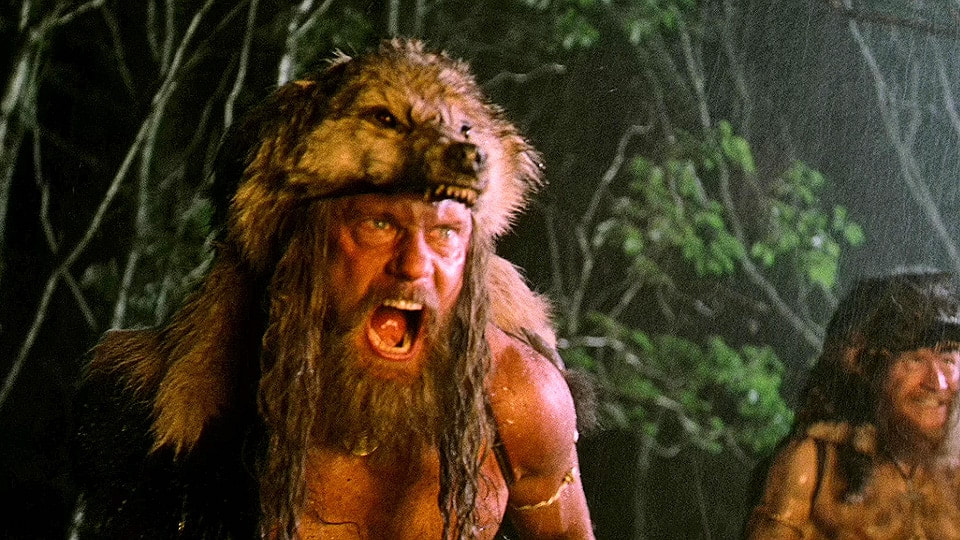The Northman is a straightforward revenge story, and if it doesn’t reinvent the genre, it shapes it to its particular environment. The film, written by Eggers and Icelandic poet Sjon, does the usual thing of complicating Amleth’s plan once he gets within striking distance of Fjolnir at around the film’s halfway point. Fellow historical epic Gangs of New York most comes to mind here, as Amleth finds a level of status on Fjolnir’s estate after surprising himself with an act of rescue, while simultaneously needing to sculpt the form his vengeance takes to align with the prophecy. This and other developments only make things more cloudy for the viewer. Amleth himself is unwavering, and so are the intercessory Norse gods who are rooting for his success. Everything in the world of the film is prodding him towards his goal, as ruinous and suicidal as it becomes. The Northman simultaneously celebrates and denigrates its protagonist, marking him as a paragon of Norse society and a bloody-minded fool incapable of seeing any other way to live.
For the film to build Amleth into a warrior destined for Valhalla, it requires Skarsgard to become an absolute beast. Superhero movies give their muscle-bound heroes magical powers that would seem to negate the need for absurd physicality created by chicken breasts and steroids. With The Northman, the transformation is a must. Sweet-faced young Amleth turns into this giant raider, deprived of his father’s warmth and training and set loose as a ravenous monster. A centerpiece raid sequence is preceded by a campfire ritual where Amleth and his comrades go into delirious fits of bloodlust, turning from men into wolves who climb the walls of a village and bite out the throats of their enemies. It’s both chilling and thrilling in a subversive way, as the verve of Eggers’ filmmaking captures the viciousness in the most evocative and kinetic way possible.
That campfire ritual is one of several immersive religious customs that The Northman doles out, each one full of power and mysticism. Willem Dafoe plays Aurvandill’s jester and takes part in a couple of these scenes, as does Bjork’s blinded seer. These play huge roles in Amleth’s life, anchoring him to prophecies and visions that he doesn’t have the imagination to interpret in any other way than the bloody path they set him on. Those visions of literal family trees and double-teethed Valkyries are stunning and feel grounded in myth. The film is at its strangest in these scenes, incorporating hallucinogens and erratic movements to sell the kind of ecstatic experience that would imprint so heavily on Amleth. Each scene and the characters within them are distinct and memorable, punctuated by portentous dialogue that’s both simple and impactful.
The Northman’s recognizability as a revenge film doesn’t limit the variations that might’ve existed within its story. There’s a version of this film that focuses on Gudrun, or Fjolnir, or Olga (Anya Taylor-Joy), a Russian slave swept up in the aforementioned raid who gets shipped off with Amleth to Fjolnir’s estate. Amleth’s focus is laser-guided, but the film’s scope is broader and recognizes that there are compelling stories happening around his. Amleth’s world ended with his father’s death, but this setting is drowning in small tragedies, plenty of which are instigated by Amleth and his raiding. The Northman, like the best revenge stories, recapitulates the endless cycle of vengeance and the impatient waiting for someone to finally break the cycle. To do otherwise is to constantly have a sword dangling over one’s head, making happiness or contentment an impossibility because someone whose vengeance is exactly as deserved as your own might be sailing towards you as you share a happy campfire with your family. The death of Norse culture is planted within the film, such that what it and its pantheon require is endless violence and degradation.
Eggers’ mastery of the film’s technical aspects is complemented by his affinity for his actors, many of whom have worked with him before and will likely work with him again. Recurring players like Dafoe and Taylor-Joy have no problem with the vernacular and the myth-making self-seriousness of the dialogue. Hawke is well-suited to a Viking king in his final years, resigned to his fate but still lusty. Aurvandill wrapping up young Amleth in a bear hug is by far the most endearing moment in a brutal film. Kidman, oddly enough, played Skarsgard’s wife only five years earlier in Big Little Lies, and if this irritating aspect of Hollywood can be ignored, she gives a fantastic performance as a woman of hidden loyalties and fierce energy, with her own centerpiece monologue. Bang makes Fjolnir repulsive and physically compelling, not quite the villain that Amleth envisions him as. The film belongs to Skarsgard, who’s been pushing the project for years. His imposing physicality exists alongside the scared little boy who rowed away from his home. That Skarsgard can bring the boy out at all when he’s covered in so much blood and muscle is a major accomplishment.
The Northman is a fantastic cinematic experience, expertly filmed and acted and envisioned by a director taking a huge leap. Propelled by a guttural score and searing cinematography, the film stuns with how it crawls into the viewer’s bones, taking them back to the frozen north of Odin and his bestial acolytes. Whatever’s in Eggers’ future will likely not be as generously funded as this. The Northman disappointed at the box office despite its onscreen power, but it’s incredible that a studio spent so much on a director unafraid of alienation and disorientation. He’s the closest thing to a historian working in major cinema, and I can’t wait to accompany Eggers to wherever and whenever he wants to take me next. A

 RSS Feed
RSS Feed